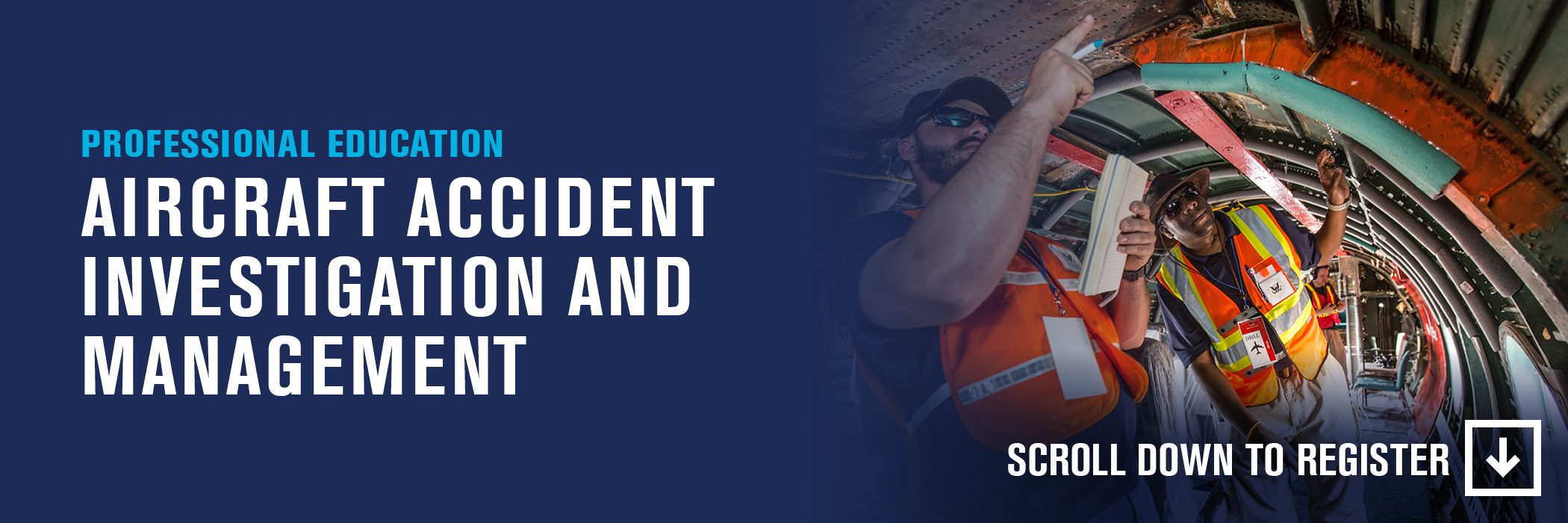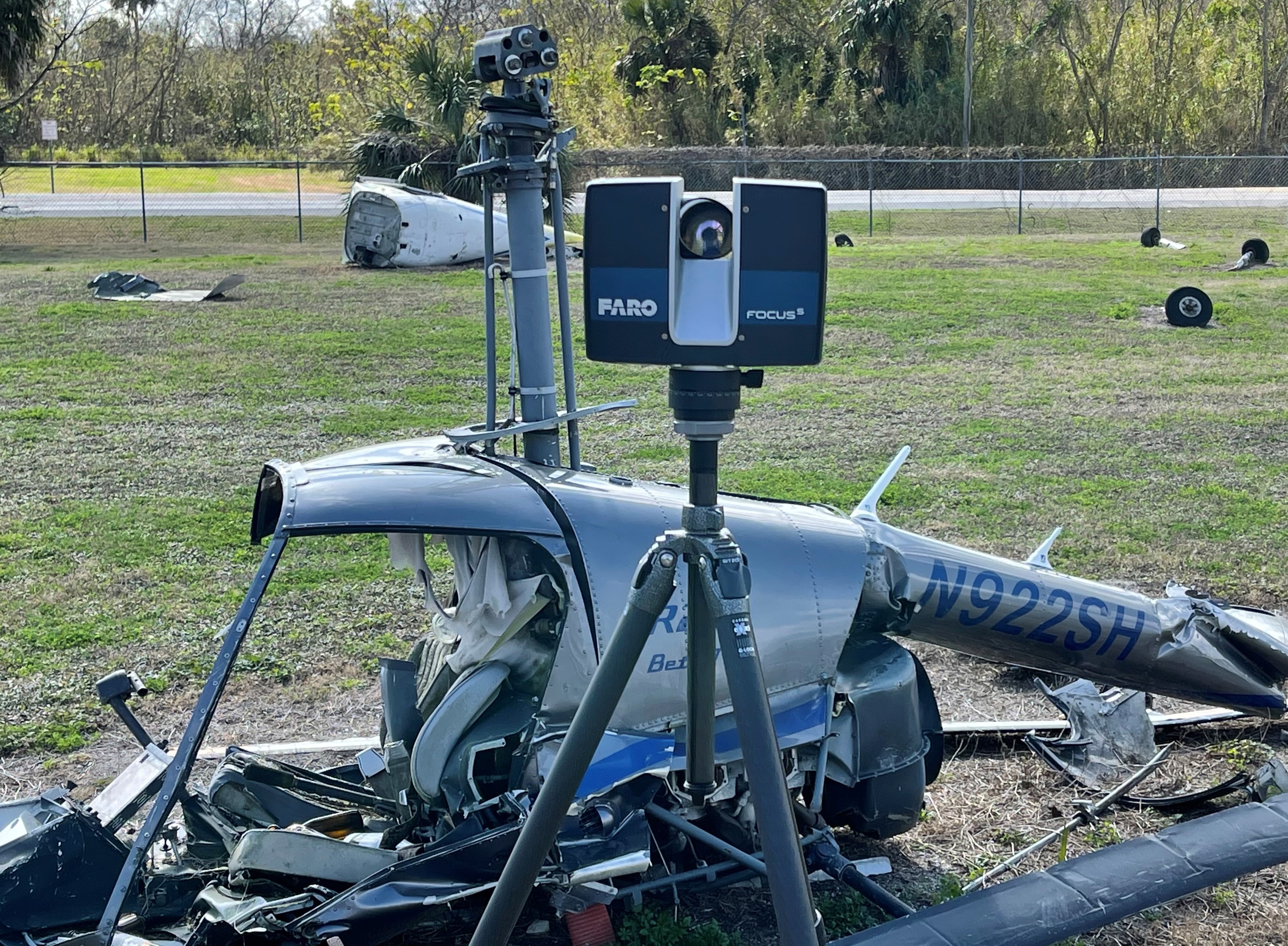Course Detail: AAIM - Aircraft Accident Investigation & Management

Master the essential skills to expertly lead or conduct aircraft accident investigations with precision and confidence.
Led by Anthony Brickhouse and Daniel Cutrer
Overview
Gain an in-depth understanding of the NTSB and ICAO investigative frameworks and deep insights into their methodologies. From the pre-planning phase to the meticulous analysis of mishaps, you'll follow the complete investigation sequence, culminating in the determination of findings, probable causes, contributing factors, and actionable recommendations.
Engage in live exercises where you'll conduct witness interviews and master site documentation through photography and the use of cutting-edge tools like the FARO Focus laser scanner. Through crash laboratory exercises and real-world case studies, you'll develop the ability to identify, collect, and analyze critical data, equipping you to navigate the complexities of aircraft accident investigations.
The participant will gain insights into the inner workings of the NTSB and ICAO investigative structure. The participant will review the investigation sequence from the pre-planning stage through the general survey and specific analysis of a mishap/accident, culminating with the determination of findings, probable cause(s), contributing factors, and recommendations.
The participants will participate in live witness interview and photography/site documentation exercises. Crash laboratory exercises and case examples help the participant identify, collect and analyze data in the process of determining probable cause/s. Participants will get hands on time using the FARO Focus laser scanner for site documentation. The participant also discovers solutions to problems faced during aircraft mishap/accident investigations.
Course curriculum and elements of this course may be applicable to meet the training requirements for eligible candidates to apply for the ICAP Federal Aviation Safety Officer Certificate (ASO). The ASO program is sponsored by the Safety Standards and Training Subcommittee of the Interagency Committee for Aviation Policy (ICAP)
This course can be taken independently, or toward the Certificate of Management in Aviation Safety and/or Certificate of Management in Aircraft Accident Investigation.
Who Should Attend
Safety is everyone's responsibility, making this course invaluable for professionals across the aviation industry, including:
- Pilots
- Airport Managers
- Safety Professionals
- Airport Risk Managers
- Air Safety Investigators

Sample of Course Topics
- Investigation Process & Procedures
- Field Investigation Techniques
- Wreckage Distribution Analysis
- Report Writing and Documentation
- Witness Interviewing Strategies
- Structural and Propulsion Investigation
- Human Factors in Accident Investigation
- Site Documentation & Reconstruction
- Aircraft Records and Factors
- Fire Investigation Techniques
- Mid Air Collision Analysis
- System and Instrument Investigation
- Analyzing Electronic Witnesses
Course Objectives
Upon completing this course, you will be able to demonstrate a deep, comprehensive understanding of risk management and proficiency in:
- Current practices and principles of aircraft accident investigation
- Roles and responsibilities of government agencies and other key entities
- Analyzing accident reports, documents, witness interviews, and causal factors
- Navigating NTSB and ICAO policies and practices
- Conducting and participating in accident investigations
- Pre-accident planning and personal safety
- Utilizing ADS-B and FDM data for investigative purposes
- Applying digital laser scanning techniques
- Investigating system, structural, and instrument failures
- Assessing accident survivability and crashworthiness
Continuing Education Units (CEUs)
Embry-Riddle will award 3.5 CEUs to each attendee who successfully completes the course. A printed Certificate of Completion will be awarded for successful completion of the course
Attendees Said...
"Very interesting and thorough introduction to aircraft accident investigation. It provided valuable methods, procedures, and techniques that can be applied in the real world."Registration Information
The preferred method of payment is credit-card at the time of registration. If you are paying by another method of payment (wire-transfer, employer voucher, check/PO), please 'Create Profile' from the left menu and then contact Daytona Beach ProEd to submit a registration request. Please note registration requests are not guaranteed until payment is received in full.
Cancellation Policy
A cancellation charge of $150 will be assessed on any standard cancellations. A late cancellation charge of 25% of the course registration fee will be assessed on cancellations occurring within 14 days of the start of the course. For additional information, please review the detailed cancellation, deferment, no-show and refund policies.

 Cart (0)
Cart (0)